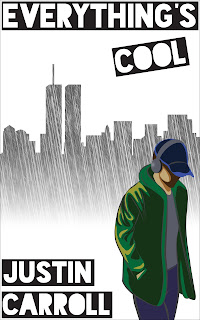When I was pimping my novella, Everything’s Cool, I received similar responses
from a number of agents, who stated that, “there’s no market for novellas.” Novellas
aren’t vogue; their odd length means that, like the three bears’, these
offerings of literary porridge just aren’t hot enough, or cool enough.
There’s no doubt that the novella has an
interesting relationship with the literary world. Agents shy away from those
works of 20,000-40,000ish words, decrying them as unpublishable. Publishers,
meanwhile, have a strange love/hate affair with them – a decent profit per
unit, but a marketing quandary: How to market something without using the
stigmatized word, “novella”.
Then there are those writers who scoff at
the novella, considering it a rambling short story or a novel that ran out of
steam, both being the product of a sub-par creative force.
But, some writers don’t take the above
view. Ian McEwan, author of the Booker shortlisted novella, On Chesil Beach, recently wrote that the
novella is “the perfect form of prose fiction”. Before him, other writers had
embraced the novella – in recent years, Kurt Vonnegut and Ray Bradbury to name
but two. Or, further back, we see Henry James, Kafka, Steinbeck, or the school
perennial, Joseph Conrad and The Heart of
Darkness.
For these writers, among numerous others,
the novella isn’t a failed novel or the product of an inability to edit. In a
novella, words cannot run riot; much like a short story, every word is
precious, every scene needs to be carefully considered with an economy of
language and description. There’s an urgency, a tension to novellas that I
personally rarely find in a novel, unless it is barely longer than a novella
itself – a shining example being Iain Banks’s The Wasp Factory.
And for readers? I’ve met very few who
would cry out in joy at the prospect of a novella any more than they would clap
excitedly at the prospect of a two-thousand page saga.
 |
| Justin Carroll |
But, what really matters is not the length
or identifier, it’s the story. Story drives and guides the novella like no
other medium. There’s no time for rambling or self-indulgence. It’s not a literary
morsel, a few thousand words to whet the appetite but leave the reader wanting.
It’s a tight story, driven by carefully created characters and plots, that
allows just enough space for them to breathe and develop in a way that a short
story often cannot. There’s something about the novella, about the tightness
and self-contained nature of it that, like a good short story, ends precisely
when it means to. By necessity the reader has to dive in and lose him- or
herself. And, to have one’s readers lose themselves in one’s world is what
every writer aspires to, surely?
I’m not saying that the novella is ‘the
perfect form’, and I’m certainly not saying that I will only write novellas.
However, I do strongly believe that the novella is as valid a choice for
storytelling as any other. Arguably, it is
a better way to tell a story than a rambling epic or an unsatisfying short
story. And, if your story reaches its
natural conclusion at a mere 30,000 words or so (42,000 in my case), don’t try
and fill it out unnecessarily. Revel in the fact that you have crafted a story
that is the length it needs to be. Be proud that you have joined the novella
alumni, those writers who have wrestled with a taxing medium and crafted a
story that is enjoyable and rewarding to read.
Then, let the readers decide: Unpublishable,
unmarketable, bastard offspring of the novel and the short story? Or a work of
fiction that, like that third bowl of porridge, is just right.


